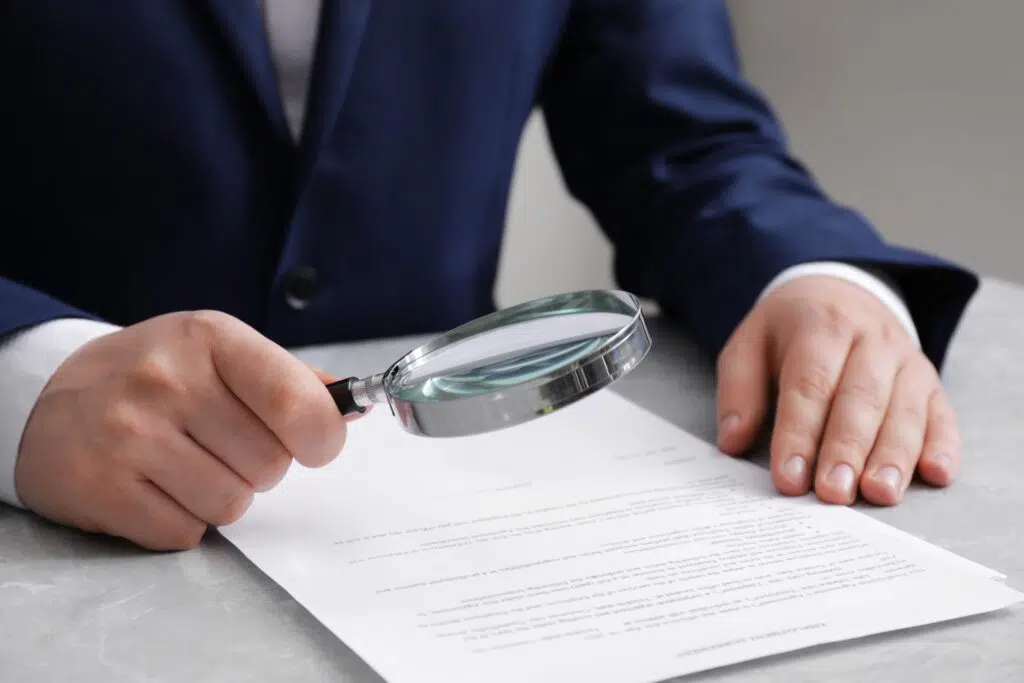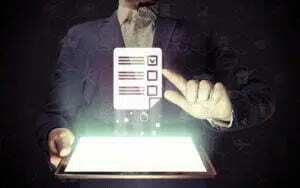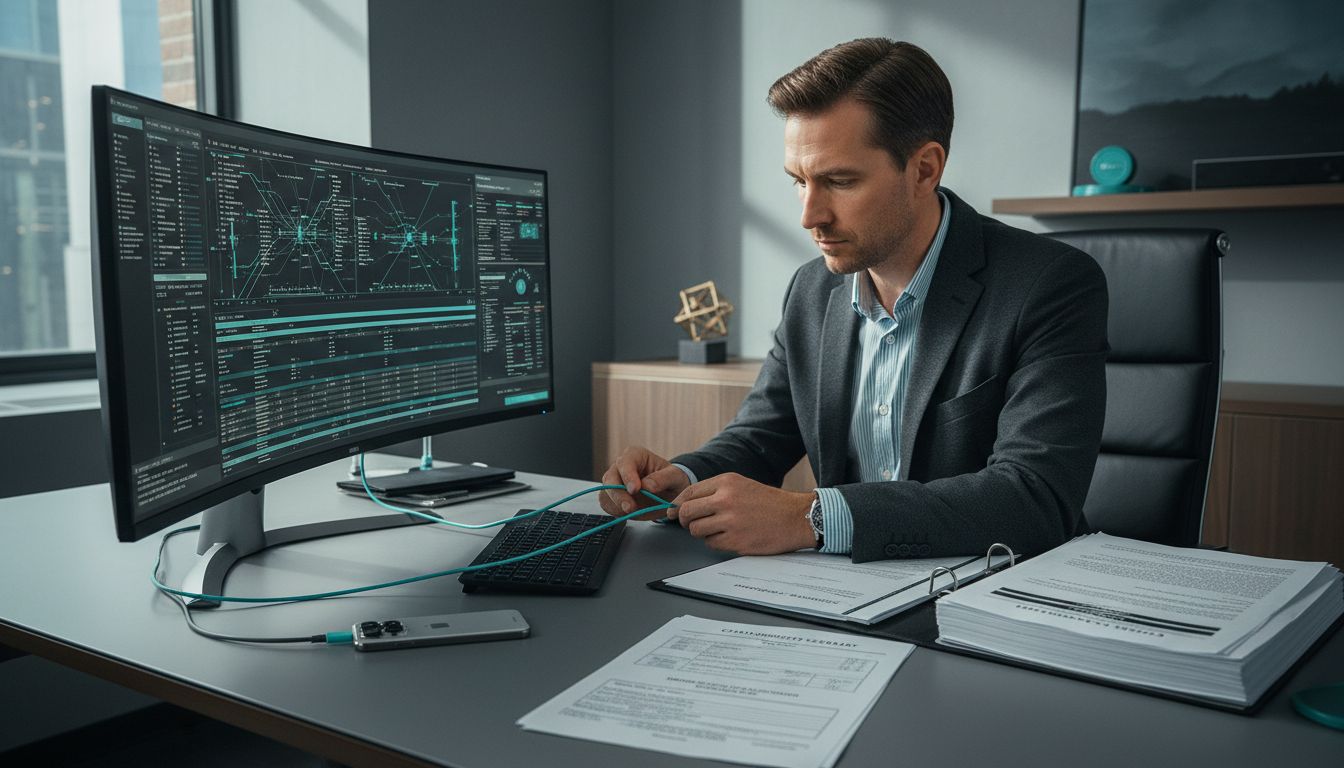How Computer Forensics Lab can help companies, private individuals, legal professionals and law enforcement to validate and authenticate digital documents: We Can Examine Your Digital Documents to Detect Tampering or Manipulation

Widespread use of digital documents such as title deeds, wills, probates, powers of attorney, contracts, bank statements, payslips, invoices and emails in disputes, civil and criminal cases due to the paperless revolution has caused serious concern about their authenticity. This is because the use of such digital documents can have a material impact in the outcome of any dispute or legal process. Therefore, it is highly important to find out if such digital documents, if presented as evidence in litigation, are genuine or have not been tampered with.
How can you tell the difference between an original digital document or one that has been tampered with or simply forged?
In order to find out the authenticity of a digital document, it has to be examined by a trained digital forensic document examiner so that all the properties of the document such as original date of creation, author, time, number of edits, modification date and the software used in creating or editing it are identified and validated.
There are several methods to validate the authenticity and integrity of a digital document. The exact method can depend on the specific type of document and the nature of the information it contains, but some general methods include:

Digital document authentication and validation
Document Metadata: Metadata provides data about the data, like creation time, last modified time, author information, etc. By examining these details, you can get clues about the authenticity of the document. However, it’s important to note that metadata can be manipulated.
Authorship Attribution and Origin: Finding the origins and author of the digital document is a crucial step in digital document examination and validation. For example, banks, governments, courts and official bodies always use distinct terminology and particular writing style in their content. Also by examining the metadata, the document examiner can identify the original device and/or software, author and even the department that created that formal document.

Digital Document Analysis
Digital Signatures: Digital signatures are used to validate the authenticity and integrity of a document. A digital signature is a mathematical technique used to validate the authenticity and integrity of a message, software, or digital document. It’s the digital equivalent of a handwritten signature or stamped seal, but it offers far more inherent security. A valid digital signature gives a recipient reason to believe that the message was created by a known sender (authentication), that the sender cannot deny having sent the message (non-repudiation), and that the message was not altered in transit (integrity).
Document Hashing: You can check the integrity of a document by comparing the hash value of the document. A hash value is a unique string of characters that a specific algorithm maps to a specific piece of data. If the document is altered, the hash value will change. However, this requires having a verified hash value from the time of document creation or a trusted source.
Certificates and Public Keys: Certificates issued by a trusted Certificate Authority (CA) can help to validate a digital document. The certificate contains a public key that can be used to verify a digital signature on the document.
Document Watermarks: Some digital documents contain digital watermarks, either visible or invisible, that can be used to check the authenticity of the document. These watermarks can contain timestamps, originator IDs, or other pieces of validating information.
Digital Forensic Analysis Software: There are forensic tools and software available that can assist in validating a digital document. These tools may use techniques such as pattern recognition, machine learning, or other methods to check the document against known indicators of forgery or tampering.
Forgery Detection: Identifying whether a document has been tampered with or forged. Techniques might include the analysis of file formats, text analysis, or image analysis.
Content Analysis: Analysis of the content in the document to identify inconsistencies, untruths, or anomalies.
Digital Document Forensics and Validation Services
Are you concerned that your digital documents may have been tampered with, forged, or altered in some way? Whether you’re a lawyer preparing evidence for court, a business verifying contract integrity, or a private individual defending your reputation, the integrity of your digital documentation is vital.

What Is Digital Document Forensics?
Digital document forensics is the branch of computer forensics dedicated to analysing electronic files for authenticity, authorship, and integrity. It involves the forensic examination of documents such as:
- PDFs
- Microsoft Word and Excel files
- Emails and attachments
- Scanned contracts and images
- Legal records
- Commercial Contracts
- Deeds, Wills and Titles
- Corporate communications
- Audit reports and business documents
Each file you create leaves behind digital fingerprints — known as metadata — that record details like creation date, modification time, author, software version, and device identifiers. Our experts analyse this metadata alongside file structure, embedded objects, and cryptographic hashes to detect hidden edits or manipulation.
Why Digital Document Integrity Matters
The authenticity of digital evidence has become a critical issue in modern litigation, compliance, and corporate governance. A single altered document can have far-reaching consequences:
- Legal disputes: Forged or modified evidence can invalidate a case.
- Corporate fraud: Unauthorised alterations can misrepresent financial or contractual obligations.
- Employment and HR matters: Altered performance documents or records can distort accountability.
- Intellectual property: Modified digital files can obscure ownership or authorship of creative work.
- Cyber incidents: Malicious actors may change timestamps or document content to cover digital footprints.
- Criminal proceedings in the court: Validation and authentication of digital documents presented to the court as evidence in support of a case or its defence.
In each of these situations, the forensic validation and authentication of your digital documents can make the difference between winning or losing a case — or between compliance and liability.
How Our Experts Authenticate Digital Documents
At Computer Forensics Lab, our forensic process follows the highest professional and evidential standards to ensure results are defensible in court. Our document authentication workflow includes:
- Forensic Acquisition
We create a bit-for-bit forensic copy of the original file or storage medium using industry-standard tools such as ExifTool, Cellebrite, EnCase, X-Ways, and FTK Imager. This ensures that the analysis is conducted in such a manner so that the original evidence remains intact.
- Metadata Analysis
Our specialists extract and analyse all metadata embedded within the document — including timestamps, author fields, version history, and device identifiers. This reveals who created the document, when it was last modified, and whether the claimed timeline matches the actual digital record.
- Hash Verification
Using cryptographic hash algorithms (such as SHA-256 or MD5), we calculate a unique digital fingerprint for each version of a file. Even a single pixel or character change will alter the hash value, providing irrefutable proof of tampering or integrity.
- Comparative Analysis
We compare different versions of a document or related files to identify any modifications. Advanced forensic tools detect changes in content, structure, or embedded elements such as hidden text, macros, and metadata layers.
- File Signature and Structure Examination
We examine the internal structure of files to detect anomalies such as mismatched headers, hidden objects, or inconsistencies between the file’s content and its declared format.
- Forensic Reporting and Expert Testimony
Our final report provides a clear, court-ready summary of findings, including detailed technical evidence, timelines, and visual aids where appropriate. Our experts are also available to provide expert witness testimony in court, explaining complex digital concepts in plain language.
Common Scenarios Where We Help
Our Digital Document Forensics services are widely used across legal, corporate, and private sectors. Below are some of the most common scenarios where our expertise proves invaluable:
- Legal Disputes and Evidence Validation
We help solicitors, barristers, and law enforcement verify whether documents submitted as evidence are authentic and admissible. From contracts and emails to financial reports, our forensic validation ensures that every file stands up to legal scrutiny.
- Contract and Agreement Verification
In commercial or civil disputes, one party may claim that a contract has been altered after signing. Our forensic analysis detects even the smallest post-signature edits or additions, preserving the original chain of custody.
- Fraud and Corporate Investigations
Businesses rely on us to uncover fraudulent activity hidden within digital files — from falsified financial reports to doctored audit trails. We work with corporate investigators to identify and expose digital deception.
- Intellectual Property and Authorship Disputes
When the origin of a document or creative work is in question, metadata analysis can prove authorship or demonstrate whether content was copied or modified without consent.
- Wills, Deeds, Titles, Leases, Bank Statements, Invoices and Contracts
Verification and authentication of such legal documents is essential to ensure their validity specially if they have presented in the court as evidence
Advanced Forensic Tools and Techniques
Our laboratory employs the same advanced tools and workflows used by law enforcement and intelligence agencies worldwide, including:
- Cellebrite for mobile and digital evidence extraction
- GreyKey for encrypted device analysis
- EnCase Forensic for comprehensive file system analysis
- X-Ways Forensics for in-depth document and metadata review
- Autopsy and FTK for file timeline reconstruction
- Hashcat and Volatility for password and memory forensics
- Adobe Forensic Suite for PDF structure validation
- ExifTool for most types of documents, images and media files
These tools allow us to conduct investigations with unparalleled precision, ensuring no hidden change or embedded data goes unnoticed.
Expert Witness Support
When digital evidence plays a critical role in your case, the credibility of your forensic expert is just as important as the evidence itself. Our examiners have experience providing expert witness testimony in both civil and criminal courts, clearly explaining:
- How document evidence was acquired and preserved
- The forensic methodology applied
- How tampering or authenticity was established
- What the metadata reveals about document history
We provide independent, impartial, and factual reports that withstand cross-examination, ensuring your evidence is presented with professional authority.
Why Choose Computer Forensics Lab
At Computer Forensics Lab, we combine technical expertise, investigative precision, and legal awareness to deliver reliable, court-admissible forensic results. Here’s what sets us apart:
Certified Expertise
Our team includes certified digital forensic analysts (CFCE, EnCE, CHFI) with years of experience across criminal, corporate, and civil cases.
Legal Admissibility
Every step of our process adheres to the Association of Chief Police Officers (ACPO) guidelines and the UK Forensic Science Regulator’s Code of Practice, ensuring all evidence is legally sound.
Confidentiality and Data Protection
We understand that confidentiality is paramount. All investigations are handled under strict non-disclosure and data protection protocols in compliance with the UK GDPR.
Comprehensive Forensic Capabilities
Beyond document forensics, we also provide:
- Mobile phone forensics
- Computer and hard drive forensics
- Email and cloud evidence recovery and forensics
- Cell-site and location analysis
UK Nationwide Support
We provide digital forensic services across the UK, working with lawyers, solicitors, law enforcement agencies, company directors, and private individuals who require independent forensic verification.
The Legal Importance of Document Authentication
In UK law, the admissibility of digital evidence depends heavily on its proven integrity and authenticity. Courts require proof that the evidence has not been altered or interfered with since it was first created or collected.
Digital forensics analysis and validation can include some of the following document types:
Digital Forensics for Solicitors and Legal Teams
Solicitors and barristers frequently engage our team for pre-trial evidence review and digital validation. We can assist with:
- Authenticating document submissions from opposing parties
- Analysing inconsistencies between versions
- Confirming metadata timestamps and authorship
- Providing affidavits or expert statements to support case submissions
Our forensic validation gives your legal arguments a foundation built on verified digital facts — not assumptions.
Private and Corporate Client Support
For Businesses
We assist companies in identifying internal fraud, contract manipulation, or intellectual property theft. Our services include the examination of corporate documents, emails, and financial records for signs of tampering or forgery.
For Individuals
If you’re involved in a legal dispute, facing false allegations, or need to validate personal documentation, we can help. Whether you suspect someone has altered your emails, contracts, or communications, our forensic experts will uncover the truth.
Digital Document Validation: Step-by-Step
Here’s what you can expect when you engage our document validation service:
- Initial Consultation:
We discuss your situation, review the digital evidence, and determine the scope of investigation required. - Evidence Collection:
You provide access to the digital documents in question, ensuring the original files or storage media are preserved. - Forensic Analysis:
Our analysts perform a detailed examination using advanced forensic tools and methods. - Reporting:
We prepare a comprehensive forensic report outlining all findings, including visual comparisons, metadata records, and expert conclusions. - Expert Testimony (Optional):
If required, our forensic experts can present findings in court or to regulatory authorities as independent witnesses.
Call us: 02071646915
Make a secure inquiry: https://computerforensicslab.co.uk/secure-inquiry/
Service Areas: Nationwide UK coverage — serving lawyers, solicitors, law enforcement, company directors, and private individuals.
Computer Forensics Lab digital document forensics team have extensive experience in examining, validating and analysing all types of digital documents. They have managed to help private individuals, legal professionals, company directors, investigators and law enforcement in identifying and authenticating digital documents since 2007. Call 02071646971 or use our secure service inquiry form here.